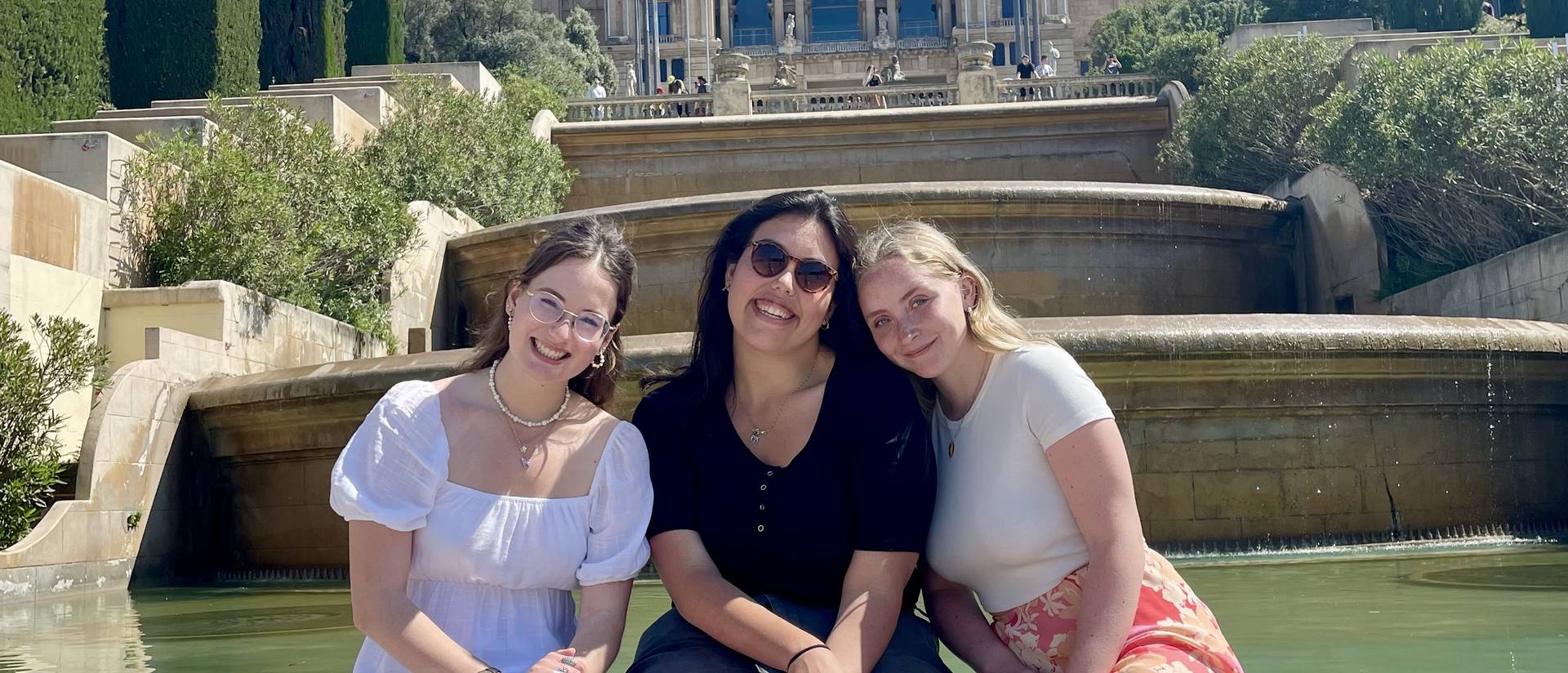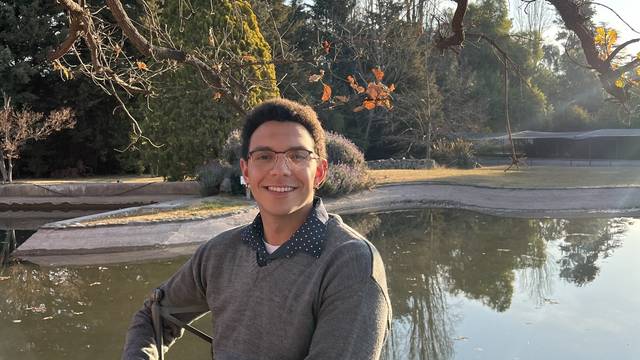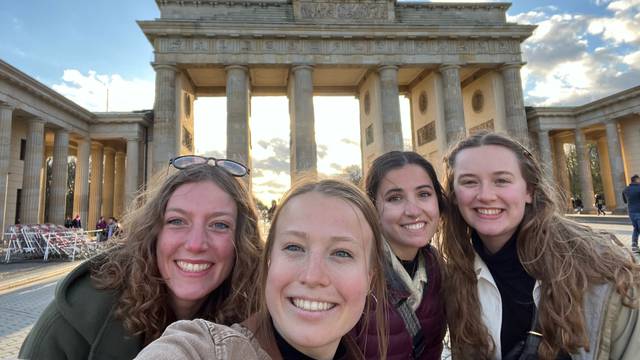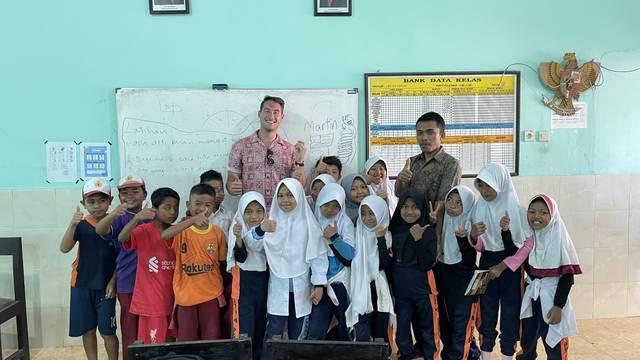Photo caption: UW-Eau Claire students, from left, Grace Schutte, Ariana Sotelo and Liz Ratajski, have fond memories of their study abroad experience.
After my semesterlong study abroad experience in Valladolid, Spain, came to an end, I felt an overwhelming sense of gratitude. Grateful for the new friends I met, all the traveling I was able to do and the irreplaceable memories I made, I could not believe my short five months abroad were coming to an end.
Above all, I was and still am most grateful for the opportunity to continue my Spanish language education in a native Spanish-speaking country. Anyone who has studied abroad can attest that there truly is no better way to learn about a culture and its language(s) than to live in a country whose native language you are studying. In fact, I spoke to various students who studied abroad in Valladolid to get more insight into the role that studying abroad plays in learning a second language for many different types of students at UW-Eau Claire.
One of the very first things I noticed when speaking with others who studied abroad in Valladolid was how their experiences further developed their passion for the Spanish language and culture. — Liz Ratajski
Faith Forstad, a third-year elementary education major and Spanish minor, fell in love with her new home for the semester. “I have a completely new appreciation for all the things of Spanish culture … the food, the music, the nightlife, the language, all of it! I absolutely have fallen in love with life. I keep telling my parents I want to move here someday; I love it so much! People are so kind, and life is just so much more relaxed here. There is happiness in the air that I can’t explain,” she says.
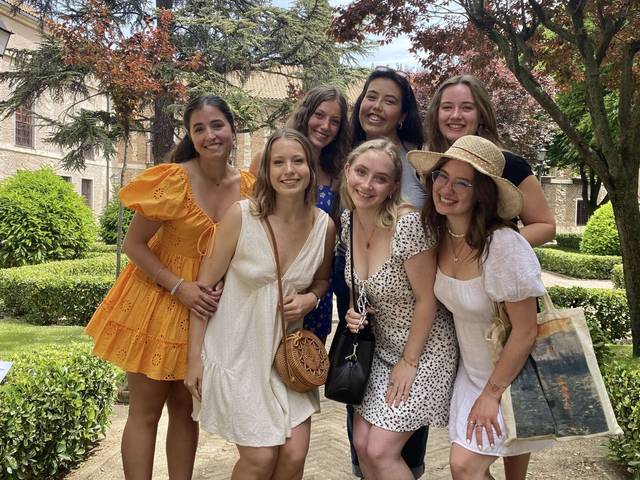
For some, this experience was only the beginning of their international endeavors. Grace Schutte, a fourth-year creative writing and Spanish major, had such a positive experience that she is considering moving abroad after graduation.
“While my Spanish is by no means perfect — I know more than I think, and that immersion only helped develop my skills. I am considering moving to a Spanish-speaking country after I graduate and teaching English for a little while. My study abroad experience was wonderful, I learned so much about myself and I can’t wait to continue my journey with the Spanish language,” she says.
While studying abroad has proven to be an extremely impactful experience for many Blugolds, there may be apprehension and anxiety that come along with deciding to live in a country with which you do not share a native language. However, many students can attest that after the initial challenges they face, they start to pick up on conversations and improve their speaking much faster than they had expected.
Ariana Sotelo, a fourth-year international business, human resources and Spanish major, explains that her best moments would happen when she was least expecting them. “I think I had a lot of ‘aha!’ moments when I was at cafés or just doing my day-to-day activities. I think some of the best feelings I had were when I would have a normal conversational exchange with someone and they didn't seem phased or confused at all by what I was saying, or that maybe they didn't see me as a foreigner as much,” she says.
Yet not all second-language learners experience the same learning curve. Forstad explains that she noticed Spanish was coming much easier to her when she was in class, working with a student from Japan. “I was paired with a boy from Japan in my class to read a five-page resume in Spanish and pick out the correct strengths and weaknesses for the job opportunity from it. It was a decently hard read, and we successfully communicated with only Spanish and found every strength and weakness correctly. Being immersed in the culture and just not overthinking every conversation like it’s an oral exam in class has helped me become more fluid in my speaking,” she explains.
When asked about their prior Spanish education and how it prepared students for their time abroad, responses varied based on the education they received before taking Spanish courses at UW-Eau Claire. While some students felt that their Spanish courses in high school were just as fundamental in their understanding of the language as the courses taken at the university level, Schutte, an Anchorage, Alaska, native, expresses that her high school education had left her feeling unprepared for Spanish courses at UW-Eau Claire.
“For the past two, three years I’d been relearning the same content over and over again, but never making much progress. College was like a wake-up call in that way. I was thrilled to finally take a step back from the grammar classes and get to learn about different accents and the fundamentals of speaking … I’m grateful for the foundation I had in the language before studying abroad and knew not to be super surprised when the Spanish over there seemed very different from the kind I had been learning in the classroom for eight years until that moment,” she describes.
Schutte’s account of her experience highlights the necessity for diversity in Spanish courses taught to those who seek to apply the language in a Spanish-speaking country. Without culturally and linguistically diverse Spanish education, the application of the language is limited to Spanish grammar and vocabulary. Students who have the opportunity to learn about more complex topics within the language and have a strong understanding of vocabulary, grammatical structures and oral language practice are set up to thrive and truly make the most of their time abroad.
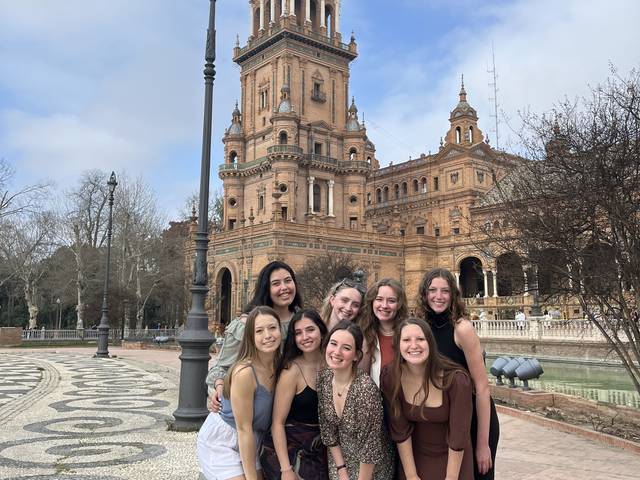
From a Spanish student’s perspective, I have personally noticed that high-impact practices like study abroad help students integrate a second language into their future careers and motivates students to study Spanish in the first place. By spending a semester in a Spanish-speaking country and learning all about its culture and history, it further contextualizes the importance of the language and encourages students to utilize their knowledge outside of the classroom.
“When you are in a place where you need to know Spanish to ‘survive,’ your perspective changes and you realize how relevant learning Spanish really is,” says Bethany Laatsch, a fourth-year chemistry and Spanish double major. While Sotelo is the perfect example of a student who seeks to incorporate their Spanish language skills into their future profession, she also notes that studying abroad has taught her skills outside of just improving her Spanish. “I am going to be in international business, so having that skill set while working internationally will be extremely beneficial. I would say that this experience also taught me so much about overcoming challenges. Outside of the Spanish aspect, being able to be challenged, such as missing a train, losing your luggage, getting lost, etc., are all experiences that I had to overcome and will help me so much in the future with my career and day-to-day life,” she explains.
Like many other students who have returned from studying abroad, I can confidently say that I would not be who I am today without that experience under my belt. Studying abroad is such a unique opportunity, especially for language students, because the ability to improve your language skills through interactions with native speakers and the learned flexibility, perseverance and worldly knowledge acquired is unlike any other educational experience one can have while attending UW-Eau Claire.
